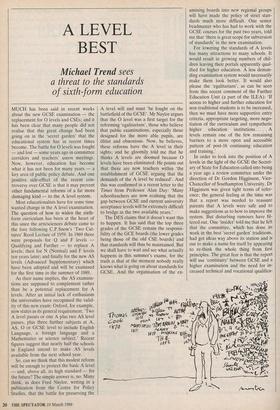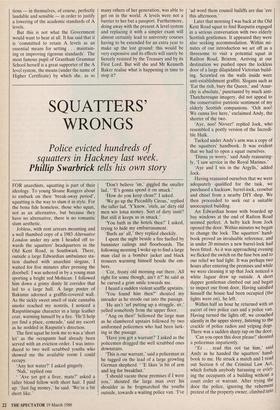A LEVEL BEST
Michael Trend sees
a threat to the standards of sixth form education
MUCH has been said in recent weeks about the new GCSE examination — the replacement for 0 levels and CSEs; and it has been clear that many people did not realise that this great change had been going on in the 'secret garden' that the educational system has in recent times become. The battle for 0 level's was fought — and lost — some years ago in committee corridors and teachers' union meetings. Now, however, education has become what it has not been for many years — a key area of public policy debate. And one positive side-effect of the recent con- troversy over GCSE is that it may prevent other fundamental reforms of a far more damaging kind — to the A level system.
Most educationalists have for some time wanted change in the A level examination. The question of how to widen the sixth- form curriculum has been at the heart of this since the arts/sciences debate came to the fore following C.P.Snow's 'Two Cul- tures' Reed Lecture of 1959. In 1969 there were proposals for Q and F levels Qualifying and Further — to replace A levels; then for N (Normal) and F levels ten years later; and finally for the new AS levels (Advanced Supplementary) which have been adopted and will be examined for the first time in the summer of 1989.
As their name implies, the AS examina- tions are supposed to complement rather than be a potential replacement for A levels. After an initial lack of enthusiasm the universities have recognised the valid- ity of this new exam: Oxford, for example, now states as its general requirement, 'Two A level passes or one A plus two AS level passes, plus three further subjects at A, AS, 0 or GCSE level to include English Language, a foreign language and a Mathematics or science subject.' Recent figures suggest that nearly half the schools in England intend to make AS levels available from the next school year.
So, can we think that this modest reform will be enough to protect the basic A level — and, above all, its high standard — for the future? The simple answer is, no. Many think, as does Fred Naylor, writing in a publication from the Centre for Policy Studies, that the battle for preserving the A level will and must 'be fought on the battlefield of the GCSE'. Mr Naylor argues that the 0 level was a first target for the reforming 'egalitarians', those who believe that public examinations, especially those designed for the more able pupils, are elitist and obnoxious. Now, he believes, these reforms have the A level in their sights; and he gloomily told me that he thinks A levels are doomed because 0 levels have been eliminated. He points out that there are now teachers within 'the establishment of GCSE arguing that the demands of the A level be reduced'. And this was confirmed in a recent letter to the Times from Professor Alan Day: 'Many schoolteachers are now realising that the gap between GCSE and current university acceptance levels will be extremely difficult to bridge in the two available years.'
The DES claims that it doesn't want this to happen. It has said that the top three grades of the GCSE remain the responsi- bility of the GCE boards (the lower grades being those of the old CSE boards) and that standards will thus be maintained. But we shall have to wait and see what actually happens in this summer's exams, for the truth is that at the moment nobody really knows what is going on about standards for GCSE. And the organisation of the ex- amining boards into new regional groups will have made the policy of strict stan- dards much more difficult. One senior headmaster who has had to work with the GCSE courses for the past two years, told me that 'there is great scope for subversion of standards' in the new examination.
For lowering the standards of A levels has many attractions to many schools. It would result in growing numbers of chil- dren leaving their portals apparently qual- ified for higher education. A less deman- ding examination system would necessarily make them look better. It would also please the 'egalitarians', as can be seen from this recent comment of the Further Education Unit (a part of the ILEA): 'If access to higher and further education for non-traditional students is to be increased, then we must have more supportive entry criteria, appropriate targeting, more nego- tiation of the curriculum and sympathetic higher education institutions . . . A levels remain one of the few remaining barriers to a more open and accessible pattern of post-16 continuing education and training.'
In order to look into the position of A levels in the light of the GCSE the Secret- ary of State for Education called into beirig a year ago a review committee under the direction of Dr Gordon Higginson, Vice- Chancellor of Southampton University. Dr Higginson was given tight terms of refer- ence; the general feeling at the time was that a report was needed to reassure parents that A levels were safe and to make suggestions as to how to improve the system. But disturbing rumours have fil- tered out. One 'insider' told me that he felt that the committee, which has done its work in the best 'secret garden' traditions, had got ideas way above its station and is out to make a name for itself by appearing to re-think the whole thing from first principles. The great fear is that the report will use 'continuity' between GCSE and a higher examination and the need for in- creased technical and vocational qualifica- tions — in themselves, of course, perfectly laudable and sensible — in order to justify a lowering of the academic standards of A levels.
But this is not what the Government would want to hear at all. It has said that it is 'committed to retain A levels as an essential means for setting . . . maintain- ing or improving rigorous standards'. The most famous pupil of Grantham Grammar School herself is a great supporter of the A level system, the means (under the name of Higher Certificate) by which she, as so many others of her generation, was able to get on in the world. A levels were not a barrier to her but a passport. Furthermore, doing away with the present A level system and replacing it with a simpler exam will almost certainly lead to university courses having to be extended for an extra year to make up the lost ground: this would be very expensive and its effects will surely be fiercely resisted by the Treasury and by its First Lord. But will she and Mr Kenneth Baker realise what is happening in time to stop it?

























































 Previous page
Previous page